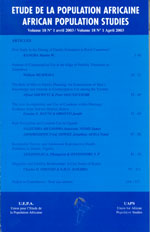
|
African Population Studies
Union for African Population Studies
ISSN: 0850-5780
Vol. 27, No. 2, 2013, pp. 229-237
|
 Bioline Code: ep13020
Bioline Code: ep13020
Full paper language: English
Document type: Research Article
Document available free of charge
|
|
|
African Population Studies, Vol. 27, No. 2, 2013, pp. 229-237
| fr |
Adebimpe, Allen Abimbola
Résumé
La population est devenue une édition de recherche importante parce que sa considération a des implications significatives pour le changement, le développement et la qualité de la vie dans la société. L'infrastructure comme l'eau, le transport, le drainage et le système sanitaire a d'autre part été reconnue d'autre part comme critique de garantir la qualité de vie et de développement urbain durable aux temps contemporains. Ce papier examine le changement dans la croissance démographique d'état d'Ondo avec une vue à la détermination de la mesure à laquelle l'infrastructure dans la région d'étude a été améliorée et ce qui sera tenu de rencontrer le MDGs pour le développement infrastructurel. Le papier discute les conséquences d'infrastructure insuffisante dans l'état d'Ondo aussi bien que s'identifie comment les cibles de MDGs peuvent être accomplies à la pauvreté urbaine réduite en Afrique. Les données utilisées dans l'étude ont provenu l'enquête systématique de caractéristiques du ménage, les indicateurs d'accessibilité à l'infrastructure fondamentale dans la ville. Les figures démographiques ont été obtenues de la Commission Démographique nationale et de la distribution de maisons régulières selon les caractéristiques principales d'infrastructure pendant le dernier recensement (2006) dans l'État Ondo. L'étude a montré que comme typique d'un État nigérian, la majorité des résidents d'état d'Ondo n'a pas d'approche à l'infrastructure fondamentale.
Mots Clés
la croissance démographique; l'équipement de Santé; les Écoles; les Buts de Développement de Millénaire et de Sustainability de L'environnement (MDGs)
|
| |
| en |
Population dynamics and infrastructure: meeting the millennium development goals in Ondo State, Nigeria
Adebimpe, Allen Abimbola
Abstract
Population has become an important research issue because its consideration has significant implications for change, development and quality of life in the society. Infrastructure such as water, transport, drainage and sanitation on the other hand have been recognized on the other hand as critical to ensure the quality of living and sustainable urban development in contemporary times. This paper examines the change in population growth of Ondo state with a view to determining the extent at which infrastructure in the study area has been improved on and what will be required to meet the MDGs for infrastructural development. The paper discusses the consequences of inadequate infrastructure in Ondo state as well as identifies how the MDGs targets can be achieved to reduced urban poverty in Africa. Data utilized in the study were derived systematic survey of household characteristics, indicators of accessibility to basic infrastructure in the city. Population figures were obtained from National Population Commission and distribution of regular households by main characteristics of infrastructure during the last census (2006) in Ondo State. The study showed that as typical of a Nigerian State, majority of the residents of Ondo state do not have access to basic infrastructure.
Keywords
Population growth; health facilities;cschools; environmental sustainability; Millennium Development Goals (MDGs)
|
| |
© African Population Studies
Alternative site location: http://www.uaps-uepa.org
|
|
